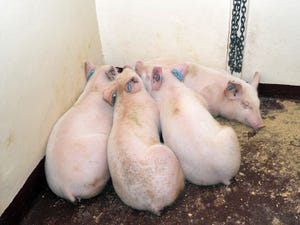Pork producers prioritize Prop 12, FADs and labor at D.C. fly-in
NPPC working with both the House and Senate to find a bipartisan solution to Prop 12 in the 2024 Farm Bill.

U.S. pork producers descended upon Washington D.C. this week to meet with policy makers regarding three key issues: the farm bill, foreign animal disease prevention and preparedness, and labor. As for the 2024 Farm Bill specifically, producers are hoping to see a federal solution to Proposition 12.
“The Supreme Court said it's an issue, and it said that Congress needs to fix it, so we're looking to Congress to fix it,” says National Pork Producers Council President Lori Stevermer and a pork producer from Minnesota. “And really as we talk about the situation, I mean the comments that I hear from producers are, we don't want a patchwork of regulations across the country. So, we're looking to get that federal solution to avoid that patchwork.”
Stevermer points out Prop 12 is not only impacting pork producers but consumers as well. A recent study conducted by the USDA’s Office of the Chief Economist found that prices of select pork products are 20% higher in California now that Prop 12 is in effect and consumption of fresh pork in that state has declined by 8 to 10%.
Increased prices and reduced availability is exactly what USDA Secretary Tom Vilsack was referring to when he testified earlier before Congress about the “chaos” that would ensue, partially in California for consumers, but also with a patchwork across the country, says Bryan Humphreys, NPPC chief executive officer.
“As we look forward, our goal, and the direction that we have from our board and our producers, is to ensure that there is not a patchwork of 50 different regulations from across the country, and to ensure that we can provide stability to our producers to do what's right for their farms and for their animals, and make sure that they can raise those animals in the best way that they know how on their farms,” Humphreys says.
While NPPC is working with both the House and Senate to find a bipartisan solution to Prop 12 in the 2024 Farm Bill, Humphreys says the organization is open to other opportunities if needed, such as a standalone bill.
“Even a producer that has made the change to become Prop 12 compliant, they're worried about what the next state could do,” Stevermer says. “Maybe that's 28, 29, 30 square feet, so we need certainty and whatever language gets us to there is very important.”
Another priority for pork producers in the 2024 Farm Bill is funding for foreign animal disease prevention and preparedness, including the National Animal Vaccine and Veterinary Counter Measured Bank, the National Animal Health Laboratory Network and the National Animal Disease Preparedness and Response Program. In addition, Humphreys says feral swine eradication and the Beagle Brigade Act continue to be top priorities for the industry, as well as expanding market access.
This week pork producers also addressed the need for year-round H-2A visas to combat the ongoing labor challenges in rural America.
Rob Brenneman, NPPC vice president and a pork producer from Iowa, has seen labor issues firsthand.
“Washington County, Iowa is a very employed county, so it's hard to get labor locally and with the TN program, something has changed in that program. It's not as easy to get TNs as we had,” Brenneman says. “We need to address that issue because labor is a big deal to us, and when you look at Prop 12, for example, which we have a large Prop 12 farm, that definitely requires a little more labor, and it also requires a little more technology, to help us to be more productive in that situation, and the two go together because Prop 12 takes more labor also.”
About the Author(s)
You May Also Like





